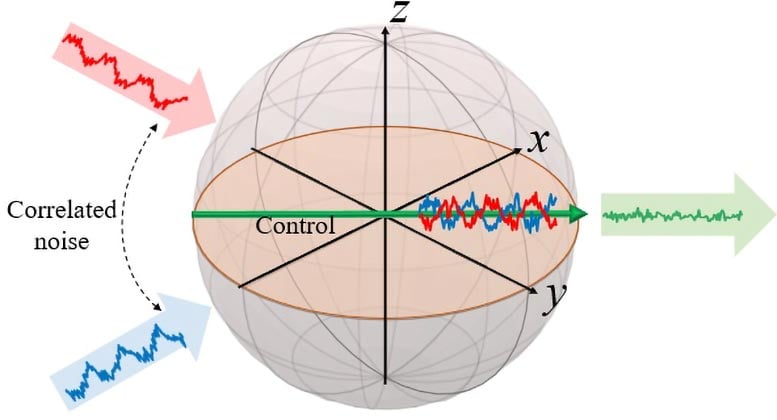Researchers have developed a groundbreaking method to improve the stability and performance of quantum systems and address issues such as decoherence and control errors. The method, which exploits the cross-correlation between two noise sources, increases the coherence time by a factor of 10, improving control fidelity and enhancing the sensitivity of quantum sensing.
The new quantum method significantly improves the system’s coherence and detection capabilities, widening the range of potential applications in precision industries.
A new method to dramatically improve the performance of quantum technologies exploits the cross-correlation of two noise sources to extend coherence time, improve control fidelity, and increase the sensitivity of high-frequency sensing. This innovative strategy addresses a key challenge in quantum systems, increasing stability by a factor of 10, paving the way for more reliable and versatile quantum devices.
Quantum Technology Breakthrough
Researchers have developed a new method to dramatically improve the stability and performance of quantum systems, marking a major advancement in quantum technology. This pioneering work addresses the long-standing challenges of decoherence and imperfect control, paving the way for more reliable and sensitive quantum devices.
Quantum technologies such as quantum computers and quantum sensors have great potential to revolutionize fields as diverse as computing, cryptography and medical imaging. However, their development has been hindered by the harmful effects of noise, which can perturb quantum states and introduce errors.

The Bloch sphere of a qubit exposed to cross-correlated noise (blue and red). The method interferes destructively with this noise, resulting in superior performance. Credit: Author
Overcoming noise in quantum systems
Many previous approaches to mitigating noise in quantum systems focus primarily on temporal autocorrelation, which examines how the noise behaves over time. While these methods are effective to some extent, they fall short in the presence of other types of noise correlation.
The research was carried out by quantum physics experts Alon Salkhov, a PhD student under the supervision of Professor Alex Retzker of the Hebrew University, Qingyun Cao, a PhD student under the supervision of Professor Fedor Jeretsko and Dr. Genko Genov of the University of Ulm, and Professor Jianming Cai of Huazhong University of Science and Technology. They introduced an innovative strategy that exploits the cross-correlation between two noise sources. By utilizing the destructive interference of cross-correlated noise, the research team managed to significantly extend the coherence time of quantum states, improve the fidelity of control, and increase the sensitivity of high-frequency quantum sensing.

Schematic of the cross-correlated noise, the control sequence, and the destructive interference of the experimental setup.
Detailed explanation (from the paper):
(a) A qubit is subject to environmental noise δ
var js, fjs = d.getElementsByTagName(s)[0];
if (d.getElementById(id)) return;
js = d.createElement(s); js.id = id;
js.src = “//connect.facebook.net/en_US/sdk.js#xfbml=1&version=v2.6”;
fjs.parentNode.insertBefore(js, fjs);
}(document, ‘script’, ‘facebook-jssdk’));
Source link


